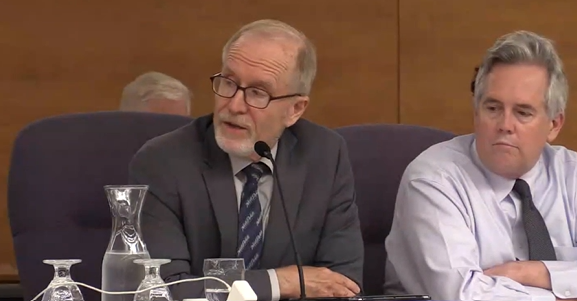You have /5 articles left.
Sign up for a free account or log in.

Mark Hagerott (center), chancellor of the North Dakota University System, is leaving his role.
North Dakota University System
In 2015, the North Dakota State Board of Higher Education hired Mark Hagerott to lead the state’s system of 11 public colleges and universities. He brought academic and military credentials: he’d been a Rhodes Scholar, a naval nuclear engineer, the commanding officer of the USS Kauffman and deputy director of the U.S. Naval Academy’s Center for Cyber Security Studies, among many other roles.
Early on, Hagerott faced allegations of bullying and sex discrimination made against him by employees in the system office, including a federal Equal Employment Opportunity Commission complaint from a vice chancellor he had fired. The accusations made national news, but the EEOC dismissed the complaint. He’s also weathered budget cuts, the pandemic and public disputes with now-former North Dakota State University president Dean Bresciani over issues such as Bresciani’s $8,300 business-class ticket to India.
As the system chancellor, Hagerott had to balance competing interests between larger and smaller institutions serving different types of students in different areas of the state. And in the past couple of years, as Republican state lawmakers have sought to weaken tenure, he’s publicly opposed their proposed legislation but also told them he’s taking action on the issue, working with his board members on a controversial proposal that could reduce tenure protections statewide.
The board has continually renewed Hagerott’s contract, hiking his pay to more than $400,000 annually. “He did bring stability to the system,” said Eric Murphy, a University of North Dakota professor and state legislator who previously served on the State Board of Higher Education. “We had had chancellor after chancellor after chancellor.”
But, last Monday night, a local columnist reported that Hagerott’s tenure might suddenly end. “I’m told by multiple reliable sources that there may be a move to oust him at tomorrow’s meeting,” Rob Port wrote in a column for the Forum News Service. Port wrote that “Hagerott critics” said “the university system is facing challenges such as declining enrollment, which Hagerott is too myopic to take on.”
Hagerott’s supporters, Port reported, gave different reasons for the attempted ouster. They said the push was coming from “Fargo-area leaders and supporters of North Dakota State University, who feel that Hagerott gives too much attention to the western institutions,” Port reported. His sources also suggested “this may be payback for the termination” of Bresciani, the columnist said.
June 25 was an interesting day to meet on the chancellor’s contract. It was the last regular meeting of the current slate of board members—less than a week before new board members, appointed by outgoing Republican North Dakota governor Doug Burgum, were set to replace two of the eight current voting board members.
When Tuesday came, the current board prepared to go into a closed session on the chancellor’s contract. It was clear the majority wanted to limit the number of people who could witness the discussion, which otherwise would have been viewable by the public, recorded and posted online.
One board member moved to invite a newly appointed student member, who would gain voting privileges July 1, into the closed-door talks, but the board voted that down 5 to 3. Further, board member Jeffry Volk said that “for this executive session, I don’t think it’s necessary and appropriate that the staff come in that report to the chancellor. This should be a discussion between the chancellor and the board only.”
The board then spent roughly an hour in private. When they emerged, the board members did vote—with no public discussion—to end Hagerott’s time as chancellor. But not with a sudden firing.
They instead unanimously extended the current end of his contract for six months, leaving him as chancellor through December 2025. They further promised him a three-year stint afterward as a distinguished professor of artificial intelligence and human security at the Dakota Digital Academy and Core Technology Services. He’ll make a $441,000 base salary until he transfers into his professor role, upon which he’ll make at least $165,000 annually (exact rate yet to be determined) for three more years.
“I want to thank the board for this transition back to academia,” Hagerott said right after the vote. “I know some eyes may glaze over, but I still am an academic.” Even before he leaves the chancellorship, he said, he’ll teach a course at North Dakota State called AI and Society: the History and Philosophy of the Human and Machine.
“This is not a golden parachute,” Hagerott told Inside Higher Ed Friday. He said, “I want to get on in teaching and research.”
“Transition” is the word Hagerott and the board’s chair have repeatedly used to describe what’s happening. He told Inside Higher Ed that he and his wife started planning a transition in early June, when she returned from visiting their youngest grandchild and noted how fast the grandchildren—who live near Washington, D.C., and Annapolis, Md.—had grown.
Hagerott said Tuesday’s vote was unanimous because “I spoke to board members before the meeting about what I wanted to do.” He said he wasn’t about to be fired, and he wouldn’t have accepted a contract that would’ve kept him in the chancellor role for longer than the 18 months he now has left.
However, he did note that one board member voted against renewing his contract last year—one from North Dakota’s largest city who, Hagerott said, was focused on the welfare of his alma mater and that city. Hagerott didn’t name names, but Volk was the only vote against his extension in 2023. Volk, who didn’t return requests for comment, lives in the Fargo area and graduated from North Dakota State.
Hagerott stressed his own role in dealing with the state’s tensions between East and West, urban and rural areas, and big and small schools. “The bigger cities have to have understanding and empathy, otherwise we’re going to have an emptied-out country,” he said.
“I have great support on the board, I admire them, but the board’s changing and government’s changing and I’m just so appreciative of this time to transition,” Hagerott said. He expressed excitement for his new AI professor role, saying the emergence of “new intelligent actors” is the most important event in the history of civilization.
A spokesperson for Burgum wrote in an email to Inside Higher Ed that “the governor supported the chancellor completing his current contract.”
Inside Higher Ed reached out to multiple board members, requesting interviews. Only chair Tim Mihalick responded, but with an email, not a call. “The chancellor and I are about the same age and, as you can imagine, we talk quite a bit,” Mihalick said. “One topic we discuss is about concern for our grandchildren and how we can make the world a better place for their future. Again the chancellor is concerned about the impact AI will have on them and felt this was his opportunity to make an impact.”
Mihalick also referred Inside Higher Ed to a podcast interview that Hagerott did after the vote with Port, the columnist who’d written about his coming ouster. Hagerott said Mihalick asked him to appear on the podcast.
In that interview, Hagerott also told Port, “There’s a board member who voted against me last year.” The chancellor also said, “There’s some people that want me to do more for particular areas, right? I’m taking a holistic view, and there’s going to be tensions.”
Near the end of the interview, Hagerott said, “There’s at least one board member who I’m not on his Christmas card list.” Port, who had been lamenting the lack of transparency regarding the board’s closed session, asked Hagerott if he wanted to name the member. Hagerott didn’t.
“Maybe,” Post said, “if the meeting had been open, we’d all know.”








